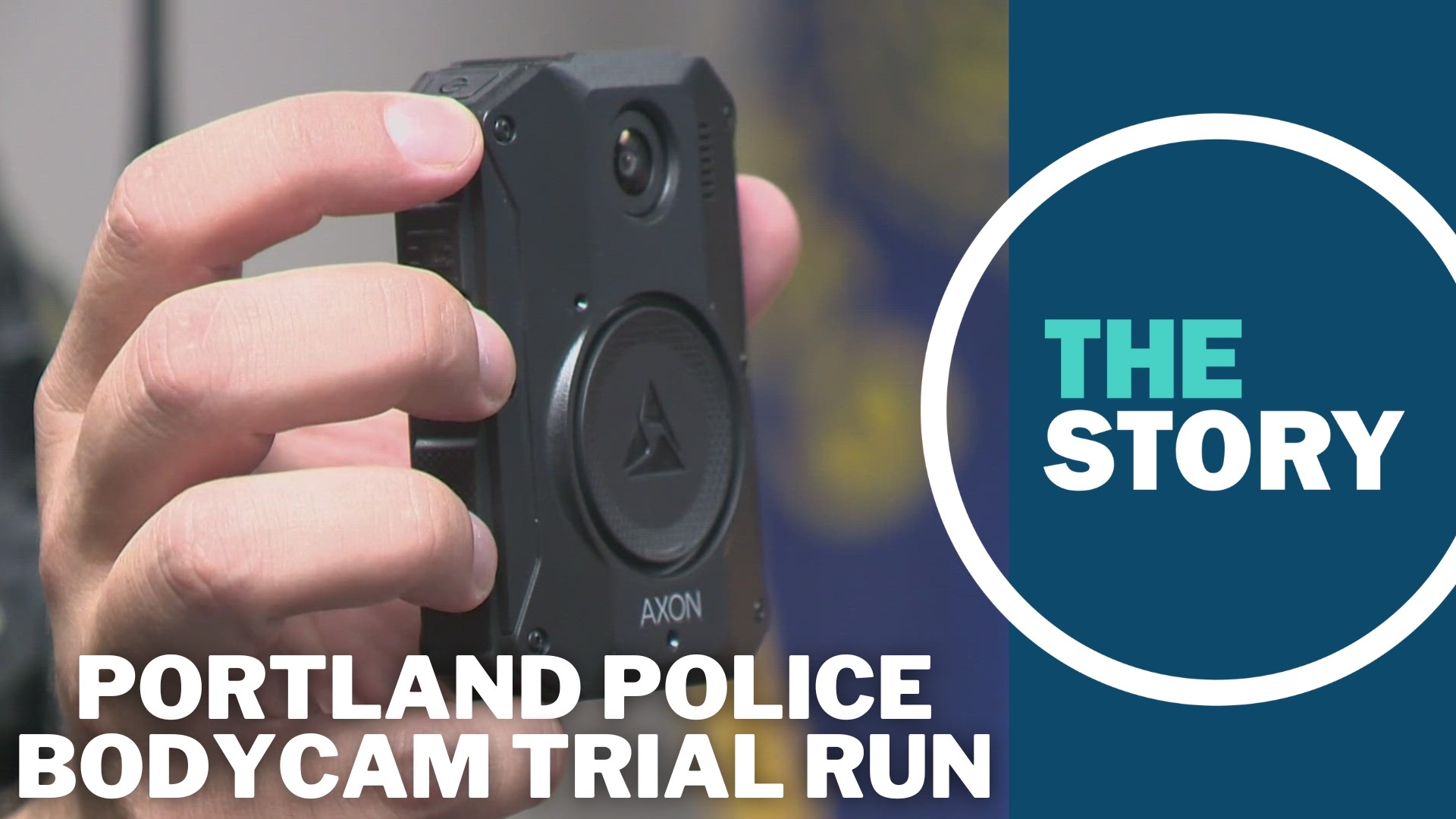PORTLAND, Ore. — Earlier this year, a lengthy power struggle between the city of Portland and its police union came to a close as the two sides finally reached an agreement on bodycam procedures, paving the way for a long-awaited pilot program to begin. Now that test-run is over, but it could still be months before Portland police officers are wearing bodycams bureau-wide.
The Portland Police Bureau currently remains the only large city police department in the U.S. without full implementation of bodycams. The city's 60-day pilot program ended last week.
Officers from PPB's Central Precinct and the Focused Intervention Team, one of the bureau's two gun violence teams, starting wearing bodycams back on Aug. 21. Portland police have yet to release any video captured during the pilot program, but agency spokesman Sgt. Kevin Allen said he's heard good reviews from officers.
"I have heard anecdotally that there have been situations where people have expressed concern about an officer's actions, maybe they've made a complaint, and they've been able to go back and pull the video and see what really took place," Allen said. "And that really resolved that much sooner than it otherwise might have."
According to Allen, the cameras do contribute to a sense of transparency and accountability, which he said the officers appreciate.
"They like that there's an unbiased view of what took place," he added.
Rules of engagement
Police bodycams are used routinely throughout the country. It's far from new, and a number of agencies across Oregon and southwest Washington beat Portland to the punch.
The cameras have the ability, within certain limitations, to take the public to the front lines of police interactions involving use of deadly force — including a deadly police shooting in Longview on Sept. 2 and a shooting along I-5 near Salem back in April.
Portland's bodycam program, which the Portland City Council approved in late April, comes with certain rules of engagement for officers, part of that hard-won deal with the police union. Now that the pilot's over, the union thinks some of those rules need to be tweaked ahead of a full rollout.
Aaron Schmautz, president of the Portland Police Association, said that each officer is required to announce they are recording, even if there are already officers at the scene who have made that clear. According to Schmautz, that created problems in an incident where officers were dealing with a suicidal person who became upset as more and more officers arrived and announced that they were recording.
Another rule in Portland's program is that officers must start recording as soon as they get a call. Schmautz said that sometimes results in 15 minutes of video showing a hand on a steering wheel as the officer drives to the scene.
On the other hand, video of officers driving has been incredibly revealing in a recent Seattle case in which an officer struck and killed a young woman while responding to a call, as well as the insensitive comments that a police union vice president made during a phone call while driving to that same scene. Since PPB is not equipped with dashcams either, bodycam footage is the only source of video likely to capture what happens while officers are on their way to a call.
Regardless, Schmautz said that officers like having bodycams, overall.
"The officers overwhelmingly have said — as they navigate writing reports or other things — having that tool available has been just huge for them," he said. "Remembering what someone says to you, your note-taking ... you don't have to be so diligent about writing stuff down in a notebook. You can keep your hands free and watching people and interacting in a more human way. I've got a lot of good reports on those things."
Prior to the deal that brought this test-run into being, the city of Portland and the PPA had reached an impasse over bodycams. The sticking point was whether officers who used deadly force could review the video before writing a report or giving a statement. The union wanted officers to have carte blanche on reviewing video while writing reports — the city did not.
The compromise they reached has officers delivering a full statement to internal affairs within 48 hours of the incident, then both parties can take a break and review the bodycam footage. Officers cannot be disciplined for any discrepancies between what they say and what the video shows unless the city can prove that they were being dishonest.
For less significant cases, officers are allowed to view the video before writing a report.
Even with this deal in place, a full rollout of bodycams for the entire Portland Police Bureau may not happen until late next summer. Results of the pilot program still need to be reviewed, and policies may need to be adjusted accordingly. Finally, Portland City Council will need to approve a contract with the bodycam manufacturer, the company Axon.
PPB said that all of this is set to happen over the next 10 months, though other officers will be trained on bodycams during that period.

